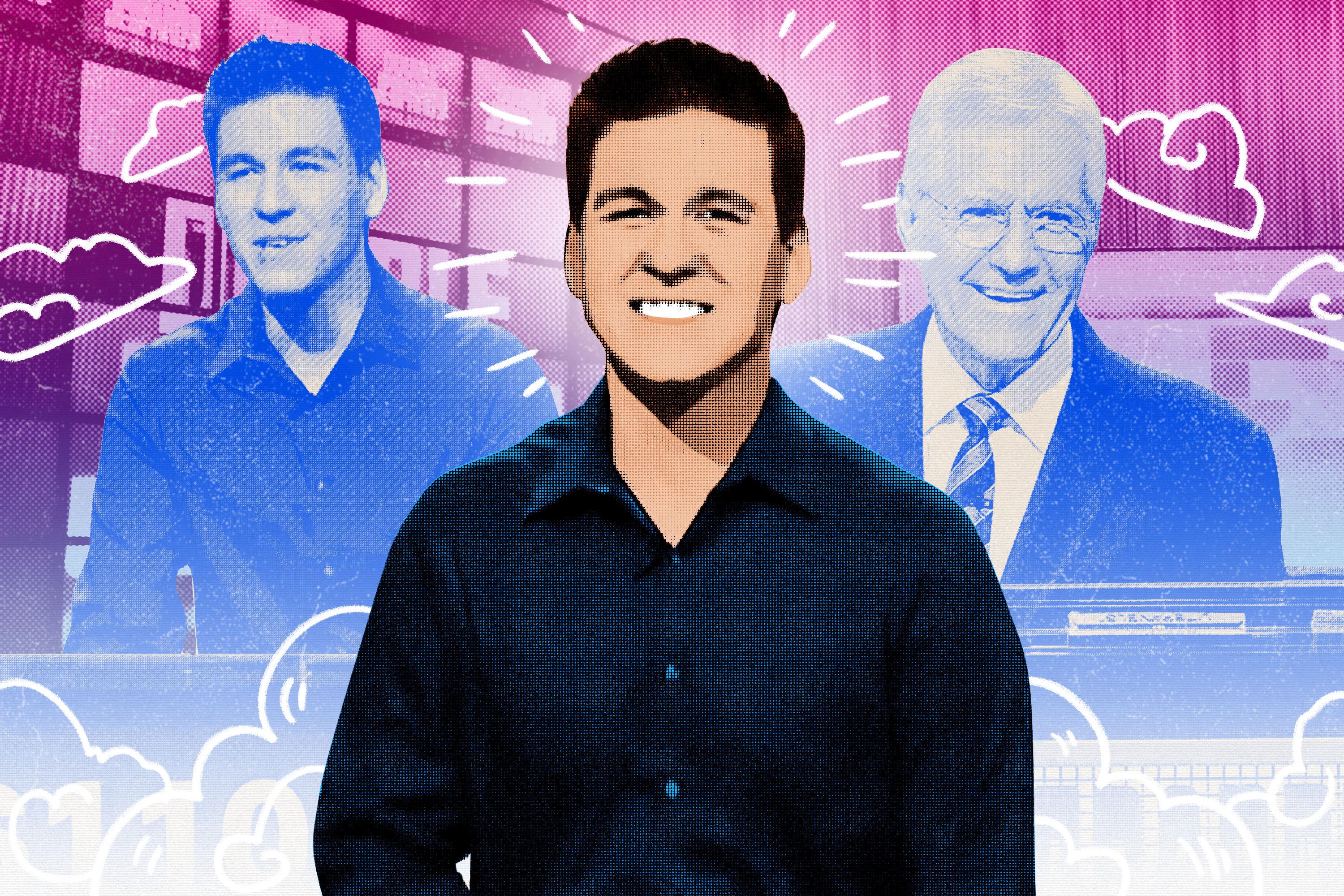Big Bets and a Fast Buzzer: The Secret Sauce of James Holzhauer’s ‘Jeopardy!’ Success
The quiz show’s reigning champ set a one-day record for winnings Wednesday with $131,127. The 34-year-old is brilliant and keen on big bets, sure. He’s also boxing out competitors almost every time he rings in.Something special is happening on Jeopardy! right now.
James Holzhauer, a [Johnny Gilbert voice] professional sports gambler from Las Vegas, Nevada, is winning, and he is winning a lot. He’s made waves both because of his success (10 victories and counting as of Thursday morning) and, especially, his betting strategy: More often than not, he likes to go for a true Daily Double and often tacks on large sums with audacious Final Jeopardy! wagers. Combined with his habit of hunting for Daily Double opportunities—he tends to jump around between higher-dollar clues instead of working his way down full categories—this has made for some extremely high scores.
On Wednesday, James—in keeping with Jeopardy! house style, let’s assume we’re on a first-name basis—set a new record for one-day Jeopardy! winnings with a total of $131,127, surpassing a record that he set scarcely a week ago when he obliterated the previous high of $77,000 set by Roger Craig in 2010 with a total of $110,914. Since his streak began on April 4, James has amassed $697,787; he now has the first, second, third, and fourth spots on the one-day record list (after winning $89,158 and $106,181 in two other games), and is in second place in all-time regular-season Jeopardy! earnings behind Ken Jennings, who reached $2,520,700 over a still-unrivaled 74 games in 2004. James, 34, is winning more, faster, than any contestant ever has.
Still, though: He’s quick to stress that things could have gone sideways—and will eventually, as all Jeopardy! reigns someday come to an end. “As a gambler, I know you can do everything right and still have to wait a long time to see positive results if luck is not on your side,” James, a Naperville, Illinois, native, says via email.
Luck, of course, plays a significant role in Jeopardy! success. Host Alex Trebek is fond of saying that either you get lucky and a given game has plenty of categories you know—you’ve got California Gold Rush history on lock and you took a Virginia Woolf class in college, how swell!—or else you get dealt a handful of blind spots (the Dreaded Opera Category, or even football) and suddenly one-twelfth or one-sixth or more of the clues are off the table for you, likely an insurmountable gap.
It’s not all luck, of course—far from it; you still need the far-flung know-how and the wagering gumption to make it count. But what sets apart the really, truly dominant players like James isn’t just luck, smarts, or betting strategy: It’s the buzzer, and James is very, very, very good at using it.
“He had a lot of questions about the subtlety of the buzzer right away,” says Jeopardy! producer Maggie Speak, who oversees contestant coordination and leads an hourlong group orientation for new players each taping day. “Before he ever hit the stage, it was: ‘Well, what if I do this?’ He had a lot of very specific questions about the timing of the buzzer.”
“And clearly my answers must have helped him,” she says, laughing.
The way the buzzer works on Jeopardy! today is seemingly designed to confound anxious bookworms. In Jeopardy!’s original run with Art Fleming as host as well as in the first year of the revival with Trebek in 1984, contestants could ring in as early as they liked. But this proved confusing to at-home viewers who wanted to play along, so the rules were changed. (Never forget that Jeopardy! has been built for the express purpose of your nightly shouting of answers—sorry, questions—at your TV.) Now, after each clue is selected, Trebek reads its text aloud. The moment he finishes, a dedicated Jeopardy! staffer sitting at the judges’ table just offstage—Michael Harris, who also serves as one of the show’s writers—manually activates a switch that illuminates blue lights alongside the outer edges of the Jeopardy! board. The moment the “enable light” switches on, the three onstage contestants are permitted to ring in, but if they press their buzzers (“signaling devices” in official Jeopardy! parlance) even a fraction of a beat too early, they will be locked out of the system for a quarter-second, which is generally enough time for a competitor to swoop in instead. It’s a mechanism that’s hidden from viewers—you can’t see the blue lights in the telecast.
As a gambler, I know you can do everything right and still have to wait a long time to see positive results if luck is not on your side.James Holzhauer
The most obvious way you can tell James is good with the buzzer is that he keeps winning. The average Jeopardy! contestant is no slouch: By the time a player is onstage, he or she has passed the show’s famously rigorous entry test twice—once online and once in person. Jennings puts it this way: “Almost all of the contestants know almost all of the answers almost all of the time,” he says. Which is to say that more often than not, all three players know a given clue’s answer, and all three are attempting to ring in—meaning buzzer timing is hugely important. James, who has lately shown off knowledge about subjects including the Book of Daniel and Tammy Wynette, says he took the online tryout test 13 times—every year that it was offered—and had two in-person auditions before he was finally invited on.
“If you put random people up there on Jeopardy!, the most important thing would be who knows the answers,” says Jennings. “But with players that good, buzzer timing really becomes what tends to separate the winner from the non-winners.”
Jennings should know: His original stint on Jeopardy!—that 74-game winning spree—was such a display of technical dominance that the show’s powers that be changed the rules to make things easier on players attempting to unseat a champion. New players begin their taping days with a practice round while Speak, having gone through the general orientation that morning, gently course-corrects contestants she notices are ringing in too early or too late, or holding the buzzer in a position likely to get them in trouble. (She advises against what she calls the “Statue of Liberty pose,” which she suggests might get tiring over a 22-minute episode.) Unlike during Jennings’s first run, this practice round now also includes Harris at the enable-light switchboard, giving challengers a crucial chance to familiarize themselves with his light-up tempo.
“The one thing you can tell to people that are going up against a buzz saw like James is trying their best just to figure out a way around his timing,” says Speak. “That’s all you can try to do.”
Different schools of thought have emerged on how best to deal with the buzzer. Some players, including Jennings, go mostly by sound: If you get Trebek’s rhythm in your head, you can get a pretty good sense of when Harris—who’s doing precisely the same thing in that moment—is going to activate the enable light.
Other players—including James—have been drawn more to the science than the art of buzzing in, leaning on the same sort of analytics-based approach that has dictated his Daily Double hunting. For these players, there is a sacred text: Secrets of the Buzzer by Fritz Holznagel.
Holznagel first competed on Jeopardy! in 1994. At the time, he didn’t worry much about the buzzer and won four games, a stint that led to invitations to three subsequent Jeopardy! tournaments, most recently the 2014 Battle of the Decades. “When I got invited back for the Battle of the Decades, I was 52 years old. I knew that I was not really in the loop on pop culture, and just generally, there’s no way you’re going to be smarter than these other contestants,” Holznagel says. “It occurred to me that if I was going to have any hope of doing well in this tournament, I would have to find some other edge.”
That edge he went about sharpening? Buzzer reaction time. Jeopardy!, he says, is a unique beast in the trivia world. “If you’re playing a College Bowl or quiz bowl or that kind of thing, people can ring in anytime,” he says. “But Jeopardy! is really unusual and different and it has this one twist, which is it’s basically a reaction-time test tacked onto a trivia contest.” He wondered: Could he hack it?
With the help of some friends, he created a wired buzzer that timed his buzzing speed, and over the course of some 27,000 tests, he managed to lower his reaction time from .228 seconds to as low as .126 seconds. Holznagel’s trials led him to a series of general guidelines for buzzer mastery: Use your thumb, keep your arms in front of you, hold still, and—if you can—chug some coffee in the green room, which Holznagel credits with shaving five one-thousandths of a second off his reaction time. Oh: And keep your eyes locked on the about-to-be-illuminated enable light.
The one thing you can tell to people that are going up against a buzz saw like James is trying their best just to figure out a way around his timing. That’s all you can try to do.Jeopardy! producer Maggie Speak
In the end, he didn’t win the Battle of the Decades—but he was so convinced by what his findings had shown that he published Secrets of the Buzzer the following year. (Sample chapter name: “What to Expect When You’re Expecting to Buzz In.”) James read it while preparing for his run and adopted Holznagel’s advice: “If you see my arm positioning on camera,” he says, “you know I followed his suggestions.”
Many players fashion their own buzzers to practice ringing in with at home: Jennings used one of his son’s toys, while many others use ballpoint pens—a memento Speak and the rest of the contestant crew give out at auditions with that in mind. In the weeks before he first went on the show, James fashioned a practice buzzer by wrapping masking tape around a mechanical pencil, below:

“I would save several episodes to watch back-to-back on my DVR, and when I had an hour free from work and parenting, I’d put on dress shoes to simulate standing that way during the tape day,” he says, clicking his pencil-buzzer as needed.
“It was kind of like there was no one else up there,” Buzzy Cohen remembers.
Cohen—a three-time contestant and winner of the 2017 Tournament of Champions—was in the Jeopardy! studio audience during one of James’s early games and saw his mastery up close. “It’s like when a great hockey player is playing, or a great basketball player,” he says. “There aren’t defenders. There’s nothing between them and the goal or them and the hoop—that’s what it feels like at times. You know there are people standing there, but they just kind of move through them.”
I’d called Cohen to ask about what struck me as an anomaly: While many über-dominant players seem to lay waste to the board, James seems so calm—almost appearing to take a moment before ringing in—that I suspected he might be unusually slow on the buzzer. Fat chance, says Cohen: “There’s an annual trivia conference in Vegas and he has won the five-by-five competition there, which is a very similar game to Jeopardy!, but instead of three contestants, it’s five contestants. So you can imagine having to buzz in faster than twice as many competitors.”
It’s like when a great hockey player is playing, or a great basketball player. There aren’t defenders. There’s nothing between them and the goal or them and the hoop. ... You know there are people standing there, but they just kind of move through them.Buzzy Cohen
Cohen’s best guess about the sometimes slow-seeming pacing of James’s episodes: James is so good that the Jeopardy! producers are having to leave in more dead time than they normally do in an episode. “Because he’s getting in first and not getting the questions wrong, less time is elapsing in the game,” he says. “So they’re stretching out that time a little bit between the question being read and someone buzzing in.”
Buzzing in isn’t the most important thing on Jeopardy!, of course. James could be the first to buzz in on every clue and make Daily Double wagers just as calculated as he has been, but if he didn’t know the answers, that would get him nowhere.
Still: “If you’re not in control of the board, if you’re not calling the clues, you don’t get to make those big bets on the Daily Double,” says Cohen. “So in order to make sure you’re in control you need to be answering questions correctly, and the best way to do that is by buzzing in first. And knowing stuff,” he adds with a laugh.
Even a few games into his run, James was already getting recognized on the street. “I haven’t placed a sports bet since March Madness ended,” he says, “but when I cashed some winning tickets after the tournament ended, the local sportsbook managers said they were rooting for me.” Elsewhere, he says, someone stopped him and exhorted him to play better that night. “OK, I’ll do my best!” he replied.
“The buzzer never stops being important,” he wrote after his seventh victory. “Of my seven games, I could have lost at least three if I had been beaten on the buzzer just one additional time in a critical spot.” Fellow competitors have asked him what he’s doing right, but he says he’s not sure whether he’s been any help. “I don’t know that I can pinpoint the secret sauce of buzzer timing,” he concedes.
James will rely on his gambling savvy and buzzer speed for as long as they will carry him, with the hopes that he can surpass Jennings’s all-time mark. But his success has been a bittersweet experience. “I had dreamed of appearing on Jeopardy! since I was a kid watching with my beloved Granny,” says James. “I promised her she’d see me on that stage one day, but I didn’t quite make it in time. I hope wherever she is, they have TV reception.”


